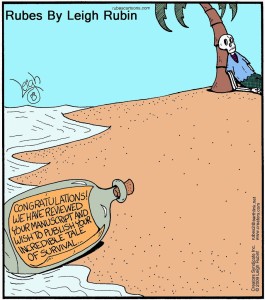This isn’t going to be news to most of you who are regular readers of The Kill Zone but it’s good advice for anyone who is trying to get published. Heck, it’s good advice if you are trying to STAY published. And we all need to be reminded of it once in a while. Here it is:
You have to be tough.
How tough? You have to have the hide of a
The tenacity of a
And the drive of a
But even with all those qualities, you are going to get rejected. It happens to all of us. And it never stops. Even after you sign your first contract, you will deal with it. Your editor will make you rewrite. The marketing department will veto your title. (Heck, one of ours got nixed by the buyer at Walmart). Barnes & Noble will stock you but Costco won’t. You won’t get reviewed or worse, you’ll get panned. You work like a dog to put your ebook on Amazon and you sell four books…three of them to your mom. And someday, you will be stalking some poor reader in the bookstore, see him pick up your book [YES! THEY LIKE ME, THEY REALLY LIKE ME!] and he will put it back on the shelf [NO! WHY DO YOU HATE MY BOOK?]
Rejection is a staple of the writer’s life, so no matter where you are on your path, you might as well begin to come to grips with it. Even after you are published with a decent track record, you can still get dumped on.
Rejection begins, of course, with query letters. This is a painful thing, the query process, because the agents who are rejecting you are usually maddeningly oblique about why they are giving you the thumbs down. Here’s some examples of coded rejections I have seen:
1. “This doesn’t fit my needs at this time.”
2. “Your writing is strong but I don’t feel I can be enthusiastic enough to fully get behind this project.”
3. “I’m afraid I will have to take a pass. But I am interested in seeing other projects…”
What they really mean:
1. You can’t write.
2. I already have four authors who write zombie Lesbian detective series.
3. DaVinci Code rip-offs are yesterday’s news. Have you considered paranormal YA?
I don’t mean to make light of your woes if you are going through any phase of rejection now. But believe me, I have been there. My entry into this business took place during the Ice Age when it was possible to still submit to editors without having an agent. (ie the Slush Pile). But the rejections were still as awful. I used to have all of them — kept them in an old manila envelope in a desk drawer. Then when we moved a couple years ago, I finally threw all the rejection letters away. Except for the first one I ever got, which I keep framed above my desk:
It is a classic. It doesn’t reproduce well here, so let me point out some really nifty things about this particular rejection letter. First, it’s a form letter. Second, there is no date. Third, there is no signature. But someone WAS kind enough to pencil in my last name and even take a moment to cross out “Sir.” I think this rejection letter is circa 1980. But you’ll notice the language has not changed since. The inserts are how I felt at the time:
Dear Ms. Montee,
We thank you for the opportunity [yeah, right!] to consider your proposal or manuscript. [what, they can’t figure out WHICH?]. We are sorry [I’ll bet!] to inform you that the book does not seem a likely prospect [how elegant!] for the Dell Book list. Because we receive many individual submissions every day [you think I care how overworked you are?] it is impossible for us to offer individual comment [I’d say so since there is no human being attached to this letter to begin with!] We thank you for thinking of Dell [insert sound of raspberry here] and we wish you the best of success [ie don’t darken our doorstep again with your crap] in placing your book with another publisher. [you’ll be sorry some day!]
Sincerely, [you’re kidding, right?]
The Editors [aka the evil Manhattan cabal trying to keep me unpublished]
So why did I keep this one? Well, with the passage of more than two decades I have gained a certain perspective about it. The manuscript I sent to Dell was really really bad. It had no business going out in the world in the state it was in. I know, because I kept it. Like this rejection letter, I kept it to remind me that this is a learning process. It still is. It always will be.
So if you are feeling blue today about rejection, just know this one thing: You are not alone. Pearl Buck’s novel “The Good Earth” was rejected on the grounds that Americans were “not interested in anything on China.” A editor passed on George Orwell’s “Animal Farm,” explaining it was “impossible to sell animal stories in the U.S.A.” And let’s not forget the agent who dumped Tony Hillerman and told him to “get rid of all that Indian stuff.”
Keep plugging away at your craft. Grow a tough hide, be brave, don’t give up, don’t be too timid to send your book out there for scrutiny. You can’t hit a home run — or even a blooper single — if you never step up to the plate. And even if you are in the batter’s box, don’t keep backing out because you’re afraid of getting beaned. Derek Jeter’s been hit by a pitch 184 times in his career. You think he’s afraid of a little chin music?
And lastly, have a little faith. Shoot, have a lot of faith:
Because it only takes one “yes” to make all the no’s bearable.







Kris, as I like to brag, I’ve been rejected by some of the biggest names in the publishing biz. Still got a rejection letter folder in the back of my file cabinet. About an inch-thick worth of letters (no email back then). They range from generic responses photocopied so many times that you can’t read them to personal, full-page mini-critiques. Reading between the lines, they all said “You’re not ready yet.” They were right.
After 6 published novels in 24 languages, my co-writer and I still get rejected from time to time. It never stops, but it does get easier. No more photocopied slips.
A note to those first-time writers who choose to skip the traditional publishing route and self-publish. Sometimes rejection letters can be a huge benefit to your career.
But why do we KEEP the darn letters, Joe? It’s sort of sick…maybe, as you say, it is to remind ourselves to be humble and to understand this isn’t easy and that you have to work at it?
Don’t know, Kris. Maybe keeping them around is like an old war vet pointing out his scars.
I don’t keep rejection letters. When I got hard copy ones, I had a ritusl to purge the negativity out of my home office. The ritual cilminated with a shredder after an interpretive dance.
But I remembered reading many interviews of debut authors and getting inspiration from the authors who bragged about getting over 100 rejections and still sold. I wanted to be that person with rhino skin. It only takes one pair of eyeballs to discover me, so my job is to hone on my craft snd keep putting my work out there until I find those peepers.
As much as I love the opportunities in self-publishing today, the struggle to get someone to invest in you teaches a writer something worth a great deal. It’s worth going through the whole painful process, no matter where you are in your career. It keeps you striving to become the best writer you csn be.
“Never give up. Never surrender.” GALAXY QUEST
ugh, typos. I hate my cell phone keyboard.
That’s a good way to put it, Jordan…”the struggle to get someone to invest in you.” Which is what traditional publishing is, at its core. A publisher places a bet on you the writer that you can produce a book that they can sell.
I laughed at the mental image of your “interpretive purge dance”…
Yes. Could you please post a video of that dance, Jordan? I think many of us would like to see that!
That dance would look something like this, except that I have no rhythm.
http://images.yuku.com.s3.amazonaws.com/image/gif/1e9351013c518d551bb13400e18d7660e9ed3bd.gif
A classic post that made me chuckle and start thinking.
Yeah, that old chestnut about how your ms just “doesn’t meet our needs at this time” is a howler. If only you’d submitted two minutes earlier — or later!
But what can compare to the rejections of family members? I can’t help but recall the unambiguous reaction Hemingway’s mother had to “The Sun Also Rises”:
The critics seem to be full of praise for your style and ability to draw word pictures but the decent ones always regret that you should use such great gifts in perpetuating the lives and habits of so degraded a strata of humanity …. It is a doubtful honor to produce one of the filthiest books of the year …. What is the matter? Have you ceased to be interested in nobility, honor and fineness in life? …. Surely you have other words in your vocabulary than “damn” and “bitch”—Every page fills me with a sick loathing.
Now that hurts.
OMG…never read that before. His own mom turned on him. Geez, that’s cold.
There is an undercurrent to this story that implies Hemingway would not be surprised by his mother’s disdain. If that’s the case, he might have smiled at reading her thoughts on his work. His style may have even stemmed from a need to make her livid. He lived an unapologetic life.
I like posts and comments that make me smile. Especially in November weather. And through the pain of NaNoWriMo. Purge dancing seems like a hell of an idea, though. Burns calories at the same time.
I’ve only kept one rejection. It was scathing. Half a page of ‘what the hell’. But after a stunned moment of silence it dawned on me that, hey, I evoked strong emotion in this reader. They took the time to point out the pointlessness of my story. And that perked me up. Apparently I feed on negativity.
I like to think of publishing like an obstacle race. The only way you get to the end is to surmount each one (often repeatedly) but you can only finish/succeed if you keep leaping those obstacles:) Not sure it gets an easier but there really are no shortcuts.
Clare,
Obstacle course, indeed. Like that TV show “Wipe Out” where the contestants get batted in the head or try to leap across slimed chasms. While the audience laughs their asses off. (Hemingway’s mom for example…)
Rejection is part of the game. But when one agent passes because she loved the character but didn’t think the story works, and the next thinks the story is intriguing but can’t really get into the character, you want to throw up your hands (or maybe just throw up) and realize, “Man, there are no rules about who gets to be an agent/editor.” But as my dad used to day, that’s why they make more than one flavor of ice cream. So you role up your sleeves and get back to work. I was eventually lucky enough to find one agent who liked the story AND liked the main character. Now we just have to find a publisher with the same taste.
John,
I’ve moderated many agent and editor panels at conferences, including the Edgar Symposium one year. The question always comes up: What exactly are you looking for? And to a one, they always answer, “a unique voice.” But when a really uniquely voiced MS crosses their desks, they often throw up their hands and say, “I don’t know how to sell this.” I had an editor reject a MS once telling me “it’s neither fish nor fowl.” WTF? Sigh…
I had an editor tell me a book I had submitted was “laugh out loud funny,” but passed, saying, “It doesn’t fit our list.” I took this to mean, “It’s not like what we’re already selling, and we don’t know how to sell what we don’t already sell.”
Hiya,
Because no one else will say it, I’ll go out on a limb here–why bother with agents? Most of them are pariahs. Before people jump on me, let me write a bit of back story.
From 2005-2007, I accumulated over 1000 rejections. Moreover, a few agents asked for an MS and sat on them…for months. Maybe the decoding of 1-3 is correct–these are the agents opinions, but they’re not the opinions of my readers.
This is the problem with the “gatekeepers.” Your old letter shows they haven’t changed in fifty years. I’ve queried young ones (probably recent MFA graduates who think they know how to write) and I’ve queried old ones (looking for that “new voice” when they don’t know what that means anymore). In fact, I don’t think anyone in the legacy publishing business is interested in new voices–only the sure thing. Yeah, they’re still handing out a few contracts, but, when your book doesn’t sell, they drop you. You have 3-6 months’ shelf time for your book.
Am I bitter? Not really. I heartily thank legacy publishers and their gatekeepers. These people forced me to go it alone and own my writing business. I’ve written 14 books now. It’s hard work but a lot more fun than trying to reach the 2000 mark on query letters…and still looking for that first book to be published.
I know authors who (1) love their agents and (2) have a good working relationship with their publisher. But these same authors say they just want to write and let someone else handle the details. Fine. To each his or her own. I prefer to be in control of my own fate.
r/Steve
Steven,
Actually, you bring up a very good question: To agent or not to agent. Before we all had the current self publishing option, having an agent was essential to getting published. Not so much anymore. And agents recognize this; the best ones are trying to adjust by becoming more accommodating to writers who are, shall we say, more non-traditional in their approaches. A couple years back, it was a rare agent who tried to place clients’ work with Thomas & Mercer, for example. Now they do it all the time. I currently do not have an agent but I still believe a good agent can be a powerful ally in a business that is fraught with uncertainty. I have also found that many agents now — mainly the younger ones — are more willing to be flexible with clients — representing some of their works or rights while encouraging the writer to explore self-publishing options at the same time. The agent-writer relationship is changing, just as the business is. But one thing has never changed — the writer MUST take responsibility for her career and not just sit back and expect an agent to play mother. If you totally abdicate your power you are a fool.
Steven, I wanted to click “Like”, like on Facebook! As another indie-published author, I hear you! 🙂
Kris –
My first novel “Nerve Damage” is/will be ready for self-pub within a month.
I sent one query letter to the agent of a best-selling author that read my first 12 chapters and suggested I send it to his agent with his recommendation. I sent in the submission materials with the agent’s client recommendation in the subject heading. That was over two months and one-half months ago and I have heard nothing. No worries as I’ve been polishing and buffing up to the present (my excellent editor, Jodie Renner has cautioned me that I’m agonizing over the manuscript).
My impression is that pursuing an agent, and then the probably similarly glacial paced pursuit of a traditional publisher will get my book to the market in a few years (if ever).
In the meantime I’ve committed to a financial obligation with an individual who may provide me no benefit. If I subsequently self-pub I could have financial/legal entanglements (e.g. agent claim on sales).
Do you think my observations/impressions are generally on target?
Thank you
I find rejection refreshing. Sometimes it hurts, but I look at is as the muscle pain after a good work out. Yes it hurts, but if followed by a properly applied response workout builds muscle where there was none before. While I did end up self-pubbing my works up to now, I didn’t tackle that beast until after one of my books made it past the gatekeepers and almost into the citadel (reached the editorial board a big-6). Once it hit that far up the hill I figured I had something going, just not that super something they wanted. So that led to the next work, my current series, which like the others will first be shopped. It has also led to that same title that almost made it a couple years ago gaining a new agent who has taken it up the hill again and has it presently about to sit before the same door, albeit at a different castle, but this time with more oomph and a sales record behind it.
So, like the others have said, rejection can be good if you can be resilient in its face.
It also helps to personify the rejectors as hello kitty zombie targets at the shooting range…
Exactly Basil. Could not agree more. This cannot be said enough: there are too many self-published books out there that are just really bad. Not ready for prime time. Just because you can push the UPLOAD NOW button on Amazon doesn’t mean you should.
ABSOLUTELY!! It only takes one!
That letter cracks me up! At least they crossed out Sir. Yes, it only takes one yes.
Thank you for this encouraging post. It is very helpful. By the way, which one was the pit bull?
Excellent post, Kris! Informative and entertaining, too! 🙂
Love Basil’s last sentence. FYI, my writing muscles were in great tone after over 1000 rejections. In previous decades, I’d have been forced to write public figures’ books for them and let them call them their own. I still could do that, of course, but I feel I wouldn’t be so entertaining to readers.
BTW, I am so pleased that everyone didn’t come down on me for speaking out. More evidence that the publishing game is changing?
r/Steve